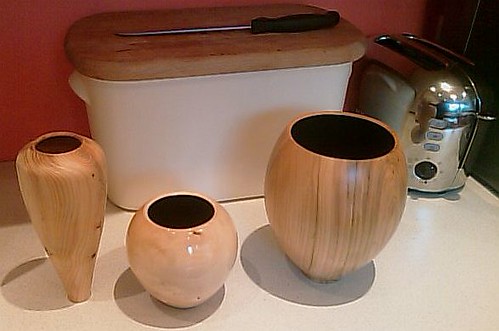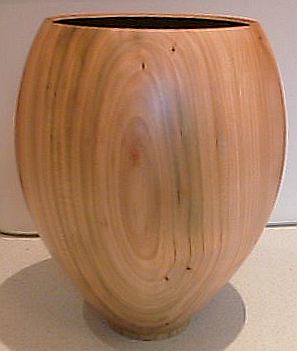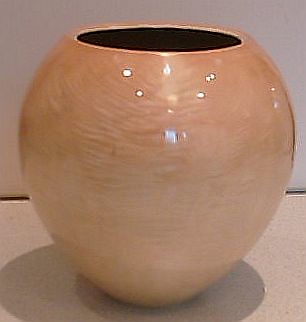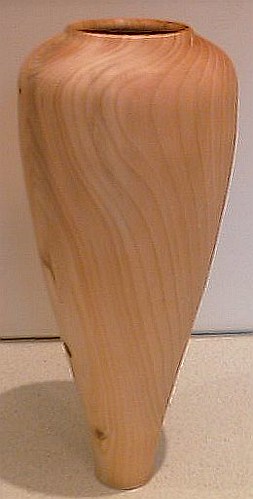TobyB
Established Member
Just spent a very interesting and pleasant couple of days outside Stratford doing a Hollowing course with Phil Irons. HIGHLY recommended!
Course was 1:1 as I was the only one there. Long days - 8.30 until about 6.00 - so a lot of teaching/talking/turning time.
I'm not a complete novice, but in no way particularly skilled ... I can make things like bowls (both small and larger salad/fruit), simple boxes, table lamps, stools, tables and the like to a standard nowhere near "gallery" or "pro", but about as good as many craft shop/stall offerings (I think), and certainly better than quite a few I've seen. I'm not trying to boast about my (certainly limited) abilities, but trying to set things in context ...
We spent a few hours looking at a variety of logs (species, size, state, etc) in a timber yard, chainsawed off some bits after selecting interesting and suitable bits and took them back for working on ... that was very useful in itself ... will investigate local sources more confidently now ...
We mounted and roughed down the 300 x 170 mm chunks of wood into cylinders with a basic hollow-form shape, initially between centres, then with a spigot held in a chuck. Nothing completely new to me here ... but what a lot to learn ... choice of tools, choice and set-up of lathe components (often quite subtle, and no dogma, black'n'white or commercial concerns apparent). How to use a bowl gouge to achieve a lot of this ... I thought I had the basics at least from practice, trial'n'(lots of)errors, reading (and re-reading) lots of books like Rowley, Rathan and O'Donnell ... but two or three significantly new (to me) grips/posture/cuts/movements to learn ... need LOTS of practice, but could get me out of all sorts of problems and deficiencies I have with my current skills.
Moved on to hollowing - initially with the Pro-edge, then with a scraper tool on a new piece - I already had played around with the Pro-edge and the McNaughton scrapers - we compared the latter with Phil's own, trying alternative tips and handles in combinations ... learned (as a lot of you already know) that there's a lot of tool hold/control, and more (equally?) important is overall strategy to hollowing to wood that makes a huge difference between a smooth even wall-thickness vessel and a lumpy ploughed-field of hills and valleys, or a piece of scrap when you've gone through the side or holed the bottom! I should have brought my own bowl gouges too - as working with your own tools and with Phil's (and vice versa) was helpful ... it'd be rubbish to find on a course you could do things just fine and then go home and be rubbish because your kit is all different. Not the case this time with the hollowing tools.
Lots of very careful observation from Phil, constantly watching and listening when you are left to get on, a fair bit of standing over you, and often better, standing behind you and either guiding/checking your movements, or briefly taking more control and letting you see and feel how it should go from the position of you actually doing it rather than observing another (I'm neither short nor thin, but Phil is big enough to reach around/see over me) - this worked really well. And there is no room or leeway for sloppy or wrong behaviour - if you aren't doing it safely, properly or completely you'll know it, and be "guided" to do it properly ... usually gently, although I did get my wrist deservedly slapped both verbally and literally.
This has been a great couple of days. I've had my brain and hands/body working flat out to absorb all I can as Phil is trying to hand over 20+ years of experience in a couple of days. LOTS to practice and remember now! And lots more to learn for sure. Good friendly atmosphere with Mike providing excellent supplies of good coffee and Billy the dog being amusing, as well as a fully-equipped warm comfortable workshop in a peaceful spot, nice "toys" to work on/with, and I've come home with a couple of reasonable pieces that are at least partly my work (but with Phil's significant input at critical moments) representing what I've learned, and how much more I need too put into practice in my own workshop.
If you think you know some basics, but want to challenge yourself, advance your skills, and have your sights raised from the moon towards the stars - treat yourself, or get someone to treat you maybe?
Course was 1:1 as I was the only one there. Long days - 8.30 until about 6.00 - so a lot of teaching/talking/turning time.
I'm not a complete novice, but in no way particularly skilled ... I can make things like bowls (both small and larger salad/fruit), simple boxes, table lamps, stools, tables and the like to a standard nowhere near "gallery" or "pro", but about as good as many craft shop/stall offerings (I think), and certainly better than quite a few I've seen. I'm not trying to boast about my (certainly limited) abilities, but trying to set things in context ...
We spent a few hours looking at a variety of logs (species, size, state, etc) in a timber yard, chainsawed off some bits after selecting interesting and suitable bits and took them back for working on ... that was very useful in itself ... will investigate local sources more confidently now ...
We mounted and roughed down the 300 x 170 mm chunks of wood into cylinders with a basic hollow-form shape, initially between centres, then with a spigot held in a chuck. Nothing completely new to me here ... but what a lot to learn ... choice of tools, choice and set-up of lathe components (often quite subtle, and no dogma, black'n'white or commercial concerns apparent). How to use a bowl gouge to achieve a lot of this ... I thought I had the basics at least from practice, trial'n'(lots of)errors, reading (and re-reading) lots of books like Rowley, Rathan and O'Donnell ... but two or three significantly new (to me) grips/posture/cuts/movements to learn ... need LOTS of practice, but could get me out of all sorts of problems and deficiencies I have with my current skills.
Moved on to hollowing - initially with the Pro-edge, then with a scraper tool on a new piece - I already had played around with the Pro-edge and the McNaughton scrapers - we compared the latter with Phil's own, trying alternative tips and handles in combinations ... learned (as a lot of you already know) that there's a lot of tool hold/control, and more (equally?) important is overall strategy to hollowing to wood that makes a huge difference between a smooth even wall-thickness vessel and a lumpy ploughed-field of hills and valleys, or a piece of scrap when you've gone through the side or holed the bottom! I should have brought my own bowl gouges too - as working with your own tools and with Phil's (and vice versa) was helpful ... it'd be rubbish to find on a course you could do things just fine and then go home and be rubbish because your kit is all different. Not the case this time with the hollowing tools.
Lots of very careful observation from Phil, constantly watching and listening when you are left to get on, a fair bit of standing over you, and often better, standing behind you and either guiding/checking your movements, or briefly taking more control and letting you see and feel how it should go from the position of you actually doing it rather than observing another (I'm neither short nor thin, but Phil is big enough to reach around/see over me) - this worked really well. And there is no room or leeway for sloppy or wrong behaviour - if you aren't doing it safely, properly or completely you'll know it, and be "guided" to do it properly ... usually gently, although I did get my wrist deservedly slapped both verbally and literally.
This has been a great couple of days. I've had my brain and hands/body working flat out to absorb all I can as Phil is trying to hand over 20+ years of experience in a couple of days. LOTS to practice and remember now! And lots more to learn for sure. Good friendly atmosphere with Mike providing excellent supplies of good coffee and Billy the dog being amusing, as well as a fully-equipped warm comfortable workshop in a peaceful spot, nice "toys" to work on/with, and I've come home with a couple of reasonable pieces that are at least partly my work (but with Phil's significant input at critical moments) representing what I've learned, and how much more I need too put into practice in my own workshop.
If you think you know some basics, but want to challenge yourself, advance your skills, and have your sights raised from the moon towards the stars - treat yourself, or get someone to treat you maybe?





































